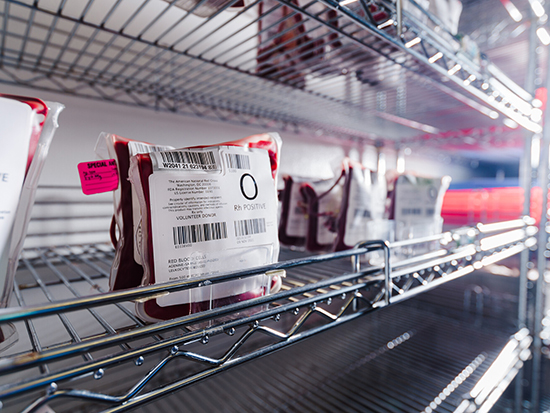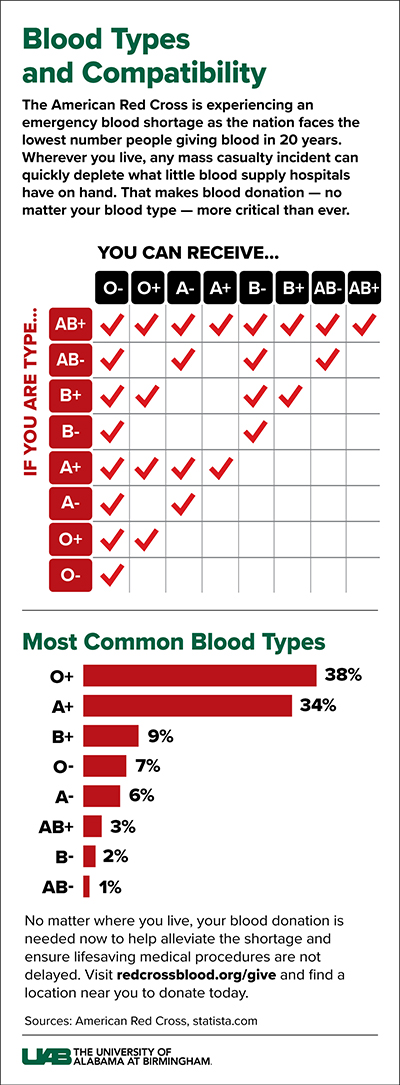 Experts at UAB Hospital answer five common questions about blood donation.Blood supplies are dangerously low across the United States. The University of Alabama at Birmingham Hospital is asking the public to roll up their sleeves and donate blood during this critical time.
Experts at UAB Hospital answer five common questions about blood donation.Blood supplies are dangerously low across the United States. The University of Alabama at Birmingham Hospital is asking the public to roll up their sleeves and donate blood during this critical time.
Those who are considering donating blood may be curious about what to expect. Experts at UAB Hospital answer five common questions about blood donation.
Who is eligible to donate?
To give blood, donors must be 17 years of age or older, weigh at least 110 pounds and be in good health, meaning the individual feels well and can perform normal activities. In certain states, donors who are 16 years old are eligible to donate if they have a signed parental consent form. Individuals with chronic conditions such as diabetes or hypertension can donate as long as the condition is under control. For a full list of criteria that may impact an individual’s ability to donate, visit redcrossblood.org.
Why should I donate?
 Every two seconds in the United States, someone needs blood, according to the American Red Cross. Blood donors help patients with multiple conditions, including accident and burn victims, heart surgery and organ transplant patients, and those battling cancer. A single unit of blood can be separated into red blood cells, platelets and plasma, so one donation can save more than one life.
Every two seconds in the United States, someone needs blood, according to the American Red Cross. Blood donors help patients with multiple conditions, including accident and burn victims, heart surgery and organ transplant patients, and those battling cancer. A single unit of blood can be separated into red blood cells, platelets and plasma, so one donation can save more than one life.
“We currently do not have a replacement for human blood,” said Katayoun Fomani, M.D., medical director of the UAB Blood Bank. “That is why it is so important for people to donate blood, so we can use it to treat our patients.”
To treat a variety of conditions, hospitals must have a stockpile of blood immediately available to treat patients who come in with life-threatening injuries. Most blood products cannot be stored for long periods of time, which means they constantly need to be refreshed. Research shows the country’s ability to treat patients who require blood on any given day is in peril, which makes donating critical in order for hospitals to maintain shelf-stable blood products.
What should I do before I donate blood?
Before an individual donates, they should make an appointment on redcrossblood.org to select the donation type and time that works best for them. In the days prior to a donation appointment, focus on eating a diet high in meat, fish, poultry, beans, spinach, iron-fortified cereals or raisins. It is important to get a good night's sleep the night before donation and to drink extra liquids to stay hydrated.
What is the donation process?
“Donating blood is not difficult at all,” Fomani said. “In fact, the donation centers have taken many steps to ensure the process is as smooth and efficient as possible as they understand that people are busy. They have made many improvements to their process.”
On the day of donation, prior to the appointment, drink an additional 16 ounces of water, eat a healthy meal and put on a shirt with sleeves that can be rolled up above the elbows. Donors should bring their photo ID, blood donor card or two additional forms of accepted identification. Donors should also bring a list of prescription and over-the-counter medications they are currently taking.
When the donor arrives for their appointment, they will be signed in by a staff member and discuss their eligibility, recent travel history and medical history. The staff member will then check the donor’s temperature, pulse, blood pressure and hemoglobin level.
For whole blood donations, the staff will cleanse an area on the donor’s arm and insert a brand-new sterile needle for the blood draw. A whole blood donation takes about eight to 10 minutes, during which the donor will be seated comfortably or lying down. When approximately a pint of whole blood has been collected, the donation is complete and a staff person will place a bandage on the donor’s arm.
After donating blood, the donor will be provided a snack and something to drink in the refreshment area. They will leave after 10-15 minutes and continue their normal daily routine.
How can you help?
To donate, individuals can visit redcrossblood.org to find a blood drive near them. For residents in the Birmingham area, UAB Hospital is hosting a blood drive in the North Pavilion Atrium on Tuesday, Sept. 24, through Friday, Sept. 27, from 9 a.m.-3 p.m. Donors can receive a Red Cross T-shirt and a $15 gift card to the merchant of their choice, while supplies last. Register here.
“I would encourage our donors to donate, because the need is constant,” Fomani said. “The impact on the community is huge as there are many patients who depend on these donations for the lifesaving care they need.”